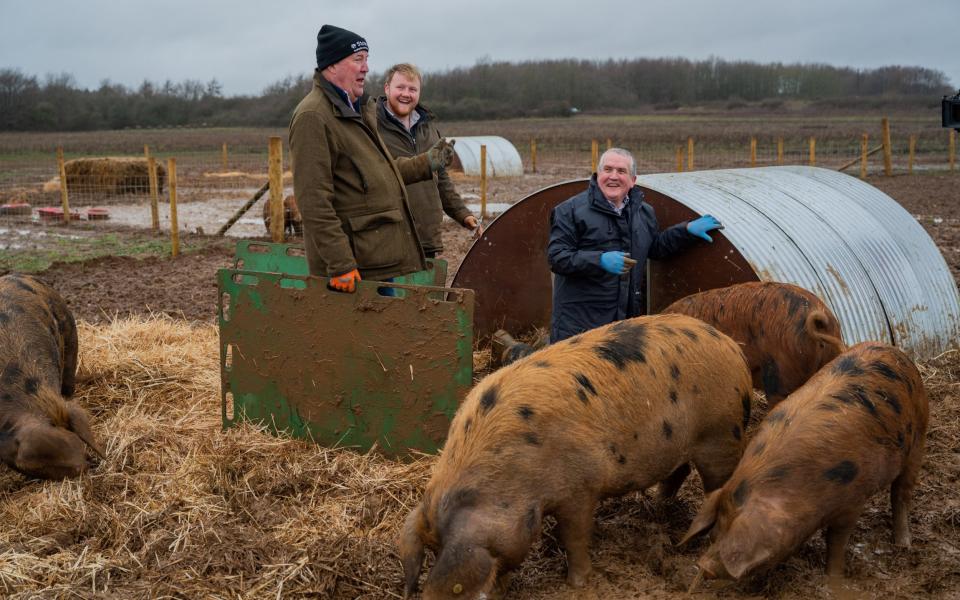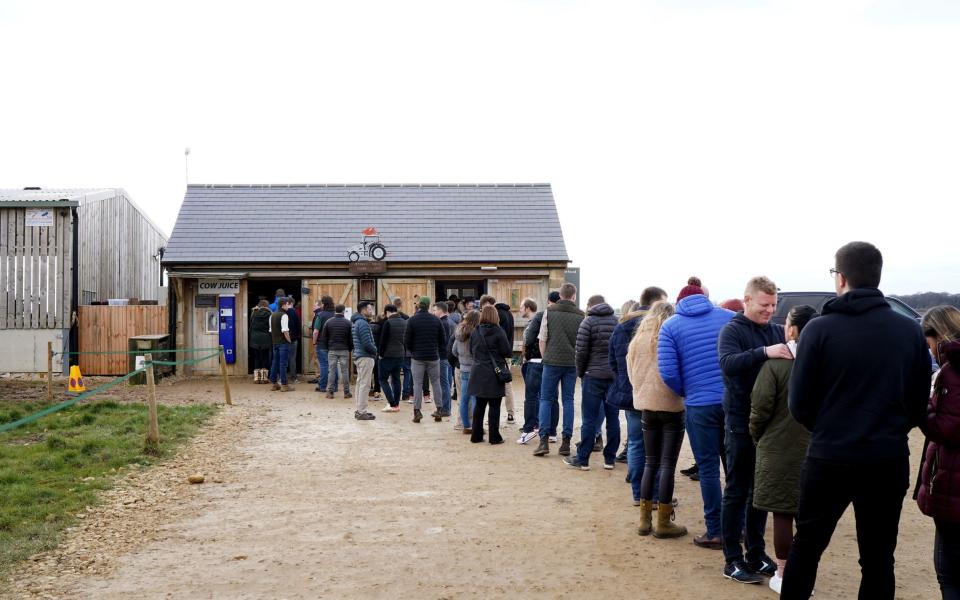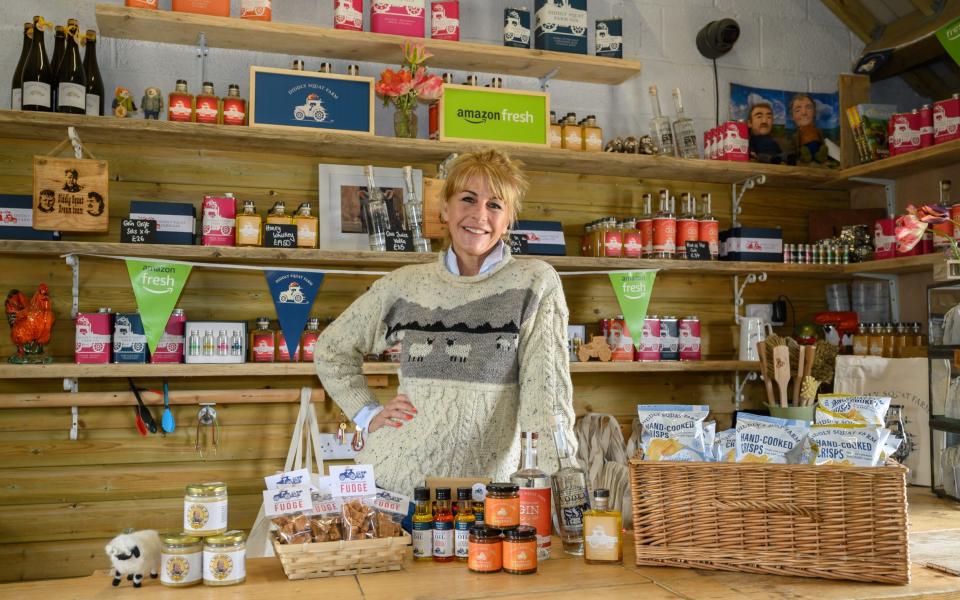It’s been a brutally brutal spring on Britain’s farms, but morale has been boosted by the screening of series three of Amazon Prime’s hit series Clarkson’s Farm. Squire Clarkson can be trusted to tell farm life as it is, with a raw honesty lacking on other channels.
His sonorous, pissed-off voiceover comments on the effects of the weather on his crops are refreshingly blunt and all the better for having no prudish links to the climate change narrative that now seems obligatory elsewhere. Sometimes only one-syllable Anglo-Saxon words can provide the meaning moth just to convey the awfulness of farming situations and the series carries the 15 rating for profanity unapologetically at the top of the screen.
The show is successful because of our hero’s endearing Toad of Toad Hall chutzpah. It’s an instantly recognizable stereotype. There’s a proud British land-owning tradition where you make a fortune, then buy a farm and keep farming until all the money runs out, usually in a wake of failed diversifications and expensive gadgets.
Clarkson challenges all received wisdom and goes out of his way to find rules to break. But we know that the bigger the problems he faces, the more publicity will be generated for his Diddly Squat brand and he will have the last laugh.
And humor is something that is increasingly missing from British rural life. Jezza’s satirical take on the humorless edicts of the ‘pig police’ provide a welcome counter-narrative to the endless stream of directives facing farmers in this country, but not necessarily elsewhere.
That said, his cavalier attitude to health and safety sometimes hits literally too close to home, as with the chainsaw nearly taking off his unprotected, denim-clad leg. In our own sparsely populated parish in Dumfries and Galloway, there have been three deaths from accidents involving livestock or machinery, and two life-changing injuries to farm workers in the last twenty years, one of which was caused by a chainsaw. Hopefully viewers will be aware that farming is a dangerous business and has been influenced more by the well-justified nonsense of land agent Charlie Ireland than by Clarkson’s example.
Political incorrectness, however, is what we love about Clarkson. His earlier decision to allow local hunting on his land – as per normal Cotswolds custom rather than the metropolitan dogma of the media bubble – led to his Hawkstone brewery being besieged by animal rights terrorists.

In this series, his throwaway comment about the pheasants he releases on his farm will undoubtedly lead to abuse from the Axis of Spite. A lesser man would have avoided talking about it on camera, but Clarkson earns respect by being willing to stand up and be considered the shooting man.
But for those of us in remote parts of Britain, Clarkson’s Farm is a representation of Cotswold rather than rural life. The area around Chipping Norton, where Clarkson farms, now probably has more in common with Chelsea than with where I farm. No one around here would think of renting goats to local celebrities to clear their wildflower meadows of thistles.
If we could start a farm shop, there wouldn’t be many customers around here willing to pay £40 for 30 portions of lion’s mane mushroom powder for coffee. And we’d be hard-pressed to find anyone willing to work in it. Since Brexit put an end to the arrival of Eastern Europeans, it has become almost impossible to find workers; We had to bring our most recent recruit all the way from the Philippines to milk our cows on a temporary visa.


But despite the mild envy many of us feel at Diddly Squat’s ability to add huge margins through direct sales, we’ve all been cheering on Clarkson in his battles with West Oxfordshire Council’s planning department. As politicians spout platitudes about farmers needing to diversify and sell directly to consumers, while at the same time ruthlessly cutting our subsidies and exposing us to free trade agreements with less restricted countries, the need for deregulation to make it easier for small farms to adapt becomes apparent. increasing. and innovation couldn’t be clearer. Meanwhile, Clarkson’s farm shop is technically prohibited from stocking a book he wrote himself because it isn’t printed locally. You couldn’t make it up.
The Cotswolds seem to have a love-hate relationship with Clarkson. On the one hand, estate agents are keen to emphasize proximity to Clarkson’s farm shop in Country Life advertisements for eye-wateringly expensive properties nearby. On the other hand, the NIMBY tendency opposed his farm store. They should be grateful that he is determined to take up farming. Elsewhere in the Cotswolds, near Badminton and Blenheim, there are plans to smother the land with city-sized solar panel complexes, which will completely change the character of the landscape.
The theme of this recent series is ‘unfarming’, and we see Clarkson literally sucking blackberries from the hedgerows to find something somewhere on his partly wooded farm that can bring in money to avoid having to rely on the highly speculative roulette game that arable farming can make. is. Agriculture. It’s a path familiar to many farmers and while we know Clarkson’s day job is still as a well-paid broadcaster and newspaper columnist, we’re happy to let his farming persona slip as we explore the uncertainties of diversification with him. The further you go from the slopes, the deeper the snow can be.


Just as the characters are crucial to any drama, the people are the critical success factor in any farming operation. And what a diamond Clarkson’s partner Lisa Hogan has become. Hands-on in the farm shop, she becomes hands-in as a midwife for the piglets. It sheds important light on farming as a family business, where spouses are typically expected to share the long hours and provide free labor to make ends meet.
Meanwhile, Clarkson’s right-hand man, 25-year-old Kaleb Cooper, has become such a celebrity in his own right that he receives an invitation to Downing Street to meet the Prime Minister. Clarkson’s decision to make him a farm manager in this series and give him the kind of autonomy most young people could only dream of is a brilliant advertisement for farming as a career choice.
It is frustrating that so many young people go to university to study environmental sciences and become agricultural bureaucrats, while it is very difficult to recruit young people directly into agriculture itself. On my farm we find it difficult to understand why that is the case. An apprentice who reaches the bottom rung of the ladder at our dairy as a teenager could earn £100,000 a year as a manager by the time he or she is 30, in a career that will not be replaced by artificial intelligence. If Kaleb proves to be a role model who recruits more young people into agriculture, the series will have had enormous benefits.
Now that Jeremy Clarkson realizes he has become more drawn to farming than he ever imagined, despite the many challenges, this is still the best job there is.
Jamie Blackett is a farmer and author of Red Rag to a Bull and Land of Milk and Honey (Quiller)